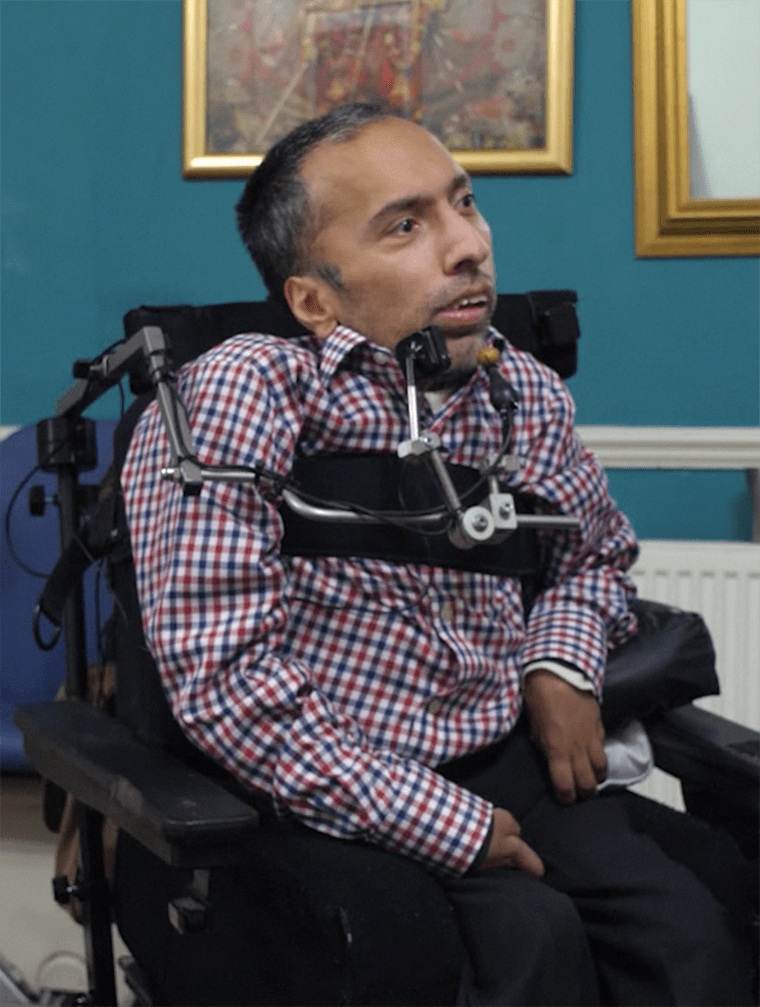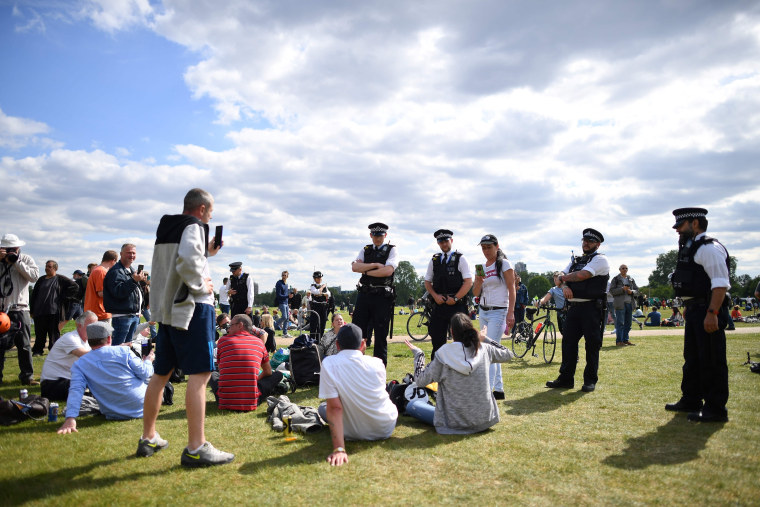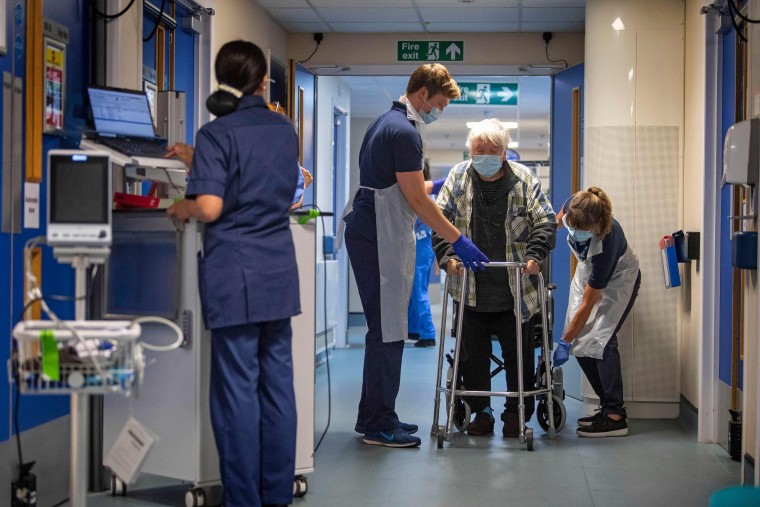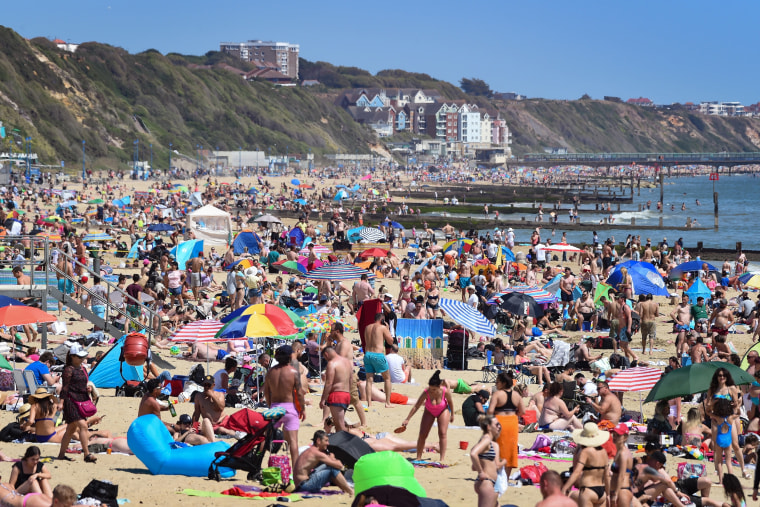LONDON — It should have been a moment of liberation: People at high risk from the coronavirus in England were told they could leave their homes for the first time in 10 weeks.
Instead, the move has turned into yet another criticism leveled at Prime Minister Boris Johnson, who has overseen the third highest number of COVID-19 deaths in the world — almost twice as high per capita as in the United States.
About 2.2 million people in the United Kingdom were told in March that, because they had certain underlying health conditions, they should "shield" at home, avoid going outside and limit contact with the people with whom they lived.
Last week, with little warning or explanation, the government announced that these regulations were being relaxed, allowing people to meet one person at a distance outside every day.
But with the government hemorrhaging trust and support, and many experts warning that Johnson is lifting the lockdown measures too soon, many of these vulnerable people say they are far from reassured it's actually safe.
Some of these people suspect the government is using the announcement as a public relations exercise — without properly considering the risk to their lives.
"The government has totally abandoned disabled people," said Ajay Yadav, 42, who has spinal muscular atrophy, a genetic disorder that causes his muscles to waste away, limiting his movement to a wiggle of his left thumb. "They don't know what to do with us, that's the bottom line."

Yadav lives in east London and works in information technology for Scope, a disability equality charity. He uses a wheelchair and needs 24-hour assistance, and the prospect of being allowed outside was tantalizing.
"Staying indoors was really starting to affect my mental health and making me feel depressed, not being able to see friends and family," he told NBC News.
Instead, he said, the government's change in policy has been poorly communicated, arriving not by doctor's letter, but trailed in the newspapers ahead of a government briefing.
He questions how there can be one policy for 2.2 million people — suitable to work for a range from more mild illnesses to serious disabilities, such as his own. Although he has started going outside, he knows his individual risk if he catches the virus has not changed.
"I haven't been reassured because no one has called me, no one has written to me," he said.
Few deny this is a delicate balance.
The government's argument is that deaths and virus transmission are lower than their early-April peak, so people who have been shielding "can choose to spend time safely outside if they wish, as long as they follow social distancing guidelines," a spokesman for the Department of Health and Social Care said in an email.
"We understand how challenging this period is, especially for those with long-term conditions and rare diseases," the spokesman added. "We are doing everything we can to support patients, led by clinical advice."

With the economy on life support, there's huge pressure to lift restrictions. But many experts fear the government is jumping the gun.
Infections are decreasing, but slowly. And the R number — the average number of people whom someone with the coronavirus will infect — is perilously close to 1, according to the government's own expert advisers. If it breaches that threshold, infections will rise.
Crucially, the government's "test, track and isolate" system is not yet operational. This means the U.K. would not be equipped to deal with a second wave, which senior officials at the World Health Organization and the European Union warn is likely.
"Many shielding people have contacted me, worried about government guidance about going for walks," Vicky Foxcroft, a lawmaker with the opposition Labour Party, said. She was speaking to Parliament on Wednesday via videolink, because she is in that vulnerable category herself.
Foxcroft asked the prime minister if he would look at providing a special walking hour for vulnerable people, as other countries have, and whether he would publish clearer information about the risks for each category of illness.
Johnson's reply that "we certainly will be doing as much as we can in the near future" was another example of the vague, belated information that's concerned many vulnerable people. They say clear, evidence-based guidance should have been published before the government came out with its surprise, headline-grabbing news conference.
"There just doesn't seem to be a rationale for why they've relaxed these restrictions on shielding," Stephen Griffin, an associate professor of virology at the University of Leeds, said. "It seems like they are trying to give a very positive picture of things when that doesn't seem to be the case."
Other countries are relaxing their restrictions, but their data appears more encouraging. One day last week, the U.K. recorded 359 coronavirus deaths — more than all 27 E.U. countries combined.
"The timing and manner of this announcement has only created more uncertainty for disabled people shielding at home," Mark Hodgkinson, chief executive of the charity Scope, said.
They "want to go out, but many are worried that it isn’t safe," he said, adding that "abruptly altering the policy before we know the impact of easing wider lockdown has left many people in a state of limbo."
Johnson was far slower than many in Europe to introduce a lockdown. He told a largely willing population that masks and testing were not essential, only to backtrack and later say they were.
The prime minister declared last week that he was "very proud" of his record.
These positive messages are making people "desensitized to these fatality numbers that we hear every day now," Griffin said. "If this was any other cause of death, we would be mortified by them."
Some fear this positive narrative is fomenting complacency. In May, while hundreds were dying every day, crowds of people were cramming into parks and beaches during the country's hottest spring on record.
And that was before it was revealed Johnson's top adviser, Dominic Cummings, appeared to break lockdown rules himself.
It's now common to hear Brits justifying their own minor lockdown infringements saying the risk to them personally is low.
But according to Rowland Kao, a professor of veterinary epidemiology and data science, that's not the point.
"For a single individual, bending the rules seems like it doesn't matter that much," he said. "But you get these multiplier effects, when lots of people start moving slightly longer distances or meeting up with slightly more people, and the net effect can be fairly substantial."

Watching people flout the lockdown is frustrating for people such as Kathy Harte, 59, who believes it will directly prolong R falling to a level where she feels safe to go out.
"It makes me bloody angry," said Harte, who is shielding because of her asthma and bronchiectasis, which widens the lungs' airways so they are vulnerable to infection.
"But I tell you, the people I'm most angry with are Boris Johnson and his merry men," Harte, who retired as a doctor partly because of her illness, said. "It's their confusing policies that have encouraged people to do this."
She does now go on walks near her home in Hertfordshire, a county north of London, but it's an experience fraught with trepidation.
Relaxing restrictions, she believes, was "a smokescreen to distract from all the criticism" and that "they're throwing us a bone because they know they're not going to get that R-number down enough to make it safe."
Of course, not everyone is so critical.
Kathleen Peat, 92, is registered blind and has arthritis and cardiac problems. After the guidelines were relaxed, her family came to stand at the top of her lawn in Lichfield, near the U.K.'s second largest city of Birmingham.
"They spread themselves out with a picnic lunch, and we shouted to each other, quite successfully, actually, and it was most enjoyable," she said.
She too feels angry at those breaking lockdown rules but says Johnson's government "has done a pretty good job" of handling the crisis.
"It's a difficult one to get that balance right. But I really think that they've got to start making a move," she said. "Unfortunately, we are at the mercy of the minority who do not obey the rules because we are all so afraid of this second peak."

